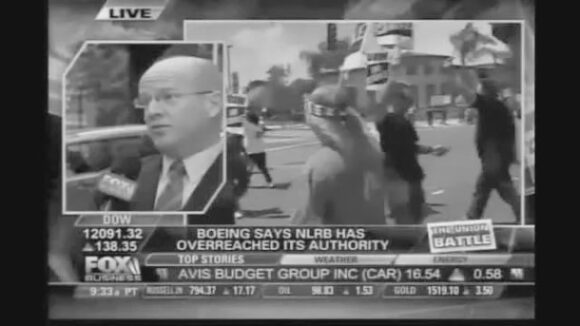2017-2018 National Right To Work Act Sponsors
115th Congress Are your Members Of Congress on this list? If not, click here and sign the National Right to Work Act petition now! Alabama Rep Mo Brooks (5) 7/18/2018 Rep Gary…

115th Congress Are your Members Of Congress on this list? If not, click here and sign the National Right to Work Act petition now! Alabama Rep Mo Brooks (5) 7/18/2018 Rep Gary…

Most employees working under a union contract have never voted to be organized by a union. Sen. Hatch and Rep. Scott want to fix that wit the Employee Rights Act. From the Washington Times: In an effort to loosen labor’s grip on workers, two GOP lawmakers want legislation that would require workers to re-affirm the existence of their unions with new votes every three years. Sen. Orrin G. Hatch of Utah and Rep. Tim Scott of South Carolina are pushing the Employee Rights Act that also would place limits on strikes, how fast a union can organize and how membership fees may be used to support political candidates. The bill has yet to receive a committee hearing in either chamber. Few workers - less than 10 percent of union members - vote to organize. Instead, most workers join an existing union as a condition of employment. This bill, however, would give workers a chance to voice their opinions. Union officials would be up for re-election every three years. At that time, employees could decide whether to keep or eliminate their union. “My goal is to make sure that employees of a company make the decision on joining unions,” Mr. Scott said. “This just gives them an opportunity to say, ‘Yes, I want to be a part of the union.’"

Right to Work President Mark Mix: "At a minimum, the House should consider appropriations amendments cutting off funds for pursuing the Boeing case and for implementing several other ongoing NLRB power grabs." Credit: Fox Business News But Board Abuses Will Intensify Unless Congress Does Much More (Source: October 2011 NRTWC Newsletter) On September 15, the U.S. House voted 238-186 to rebuke Acting National Labor Relations Board (NLRB) General Counsel Lafe Solomon for trying to dictate where businesses may or may not expand. By passing H.R.2587, the Protecting Jobs From Government Interference Act, last month, the House made a judgment that NLRB bureaucrats like Mr. Solomon should not have the power to order an employer to relocate jobs from one site to another. House members were responding specifically to Mr. Solomon's decision in April to file a complaint against Boeing for initiating a new aircraft production line in Right to Work South Carolina. In several public statements, Boeing executives had made no bones about the fact that their decision to expand in a Right to Work state was prompted largely by their desire to avoid or at least mitigate multi-billion-dollar revenue losses stemming from disruptive strikes. Agreeing with International Association of Machinists (IAM, AFL-CIO) union kingpins who had repeatedly ordered employees at Boeing's Washington State and Oregon facilities out on strike, Mr. Solomon claims these statements show Boeing was motivated by "anti-union animus." Consequently, the South Carolina expansion is illegal, declares Mr. Solomon. The Boeing case is currently before an NLRB administrative law judge and could potentially drag on for years. As Politics, 'the NLRB Issue Is a Doozy' For Big Labor Politicians Sponsored by pro-Right to Work freshman South Carolina Congressman Tim Scott (R), H.R.2587 aims to stop Mr. Solomon from penalizing employers legitimately concerned with strikes that disrupt production and alienate customers by telling them where they can or can't locate jobs.

Right to Work President Mark Mix: "At a minimum, the House should consider appropriations amendments cutting off funds for pursuing the Boeing case and for implementing several other ongoing NLRB power grabs." Credit: Fox Business News But Board Abuses Will Intensify Unless Congress Does Much More (Source: October 2011 NRTWC Newsletter) On September 15, the U.S. House voted 238-186 to rebuke Acting National Labor Relations Board (NLRB) General Counsel Lafe Solomon for trying to dictate where businesses may or may not expand. By passing H.R.2587, the Protecting Jobs From Government Interference Act, last month, the House made a judgment that NLRB bureaucrats like Mr. Solomon should not have the power to order an employer to relocate jobs from one site to another. House members were responding specifically to Mr. Solomon's decision in April to file a complaint against Boeing for initiating a new aircraft production line in Right to Work South Carolina. In several public statements, Boeing executives had made no bones about the fact that their decision to expand in a Right to Work state was prompted largely by their desire to avoid or at least mitigate multi-billion-dollar revenue losses stemming from disruptive strikes. Agreeing with International Association of Machinists (IAM, AFL-CIO) union kingpins who had repeatedly ordered employees at Boeing's Washington State and Oregon facilities out on strike, Mr. Solomon claims these statements show Boeing was motivated by "anti-union animus." Consequently, the South Carolina expansion is illegal, declares Mr. Solomon. The Boeing case is currently before an NLRB administrative law judge and could potentially drag on for years. As Politics, 'the NLRB Issue Is a Doozy' For Big Labor Politicians Sponsored by pro-Right to Work freshman South Carolina Congressman Tim Scott (R), H.R.2587 aims to stop Mr. Solomon from penalizing employers legitimately concerned with strikes that disrupt production and alienate customers by telling them where they can or can't locate jobs.

The US House of Representatives will move legislation authored by South Carolina conservative lawmaker Tim Scott that would limit the National Labor Relations Board’s ability to punish companies who seek greater competitive advantage by moving to Right to Work states,…